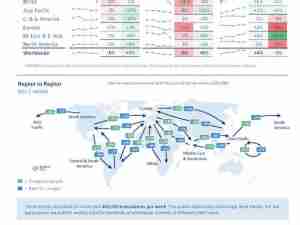London Heathrow airport’s 16 billion-pound ($21 billion) expansion plan may have cleared its last major political hurdle, but the project has yet to convince British Airways, the hub’s biggest customer.
After U.K. lawmakers backed the construction of a third runway by 415 votes to 119 late Monday, BA owner IAG SA responded by saying that the financing arrangements proposed by Heathrow are likely to increase user charges and effectively require present-day passengers to fund future flights.
“Parliament has approved Heathrow’s expansion without any idea of how much it will cost,” IAG Chief Executive Officer Willie Walsh said in a statement. “We have zero confidence in Heathrow management’s ability to deliver this project while keeping airport charges flat.”
Heathrow CEO John Holland-Kaye said the resounding approval of the government’s national policy statement on airports, which is built around the runway plan, will unlock billions of pounds in growth and create tens of thousands of jobs in the critical years after Britain leaves the European Union.
After decades of delays tied to concerns about extra aircraft noise, increased pollution, the demolition of homes and the impact on roads, construction should finally begin in 2021, he said. The new landing strip is expected to open in 2025, lifting annual capacity to 135 million travelers from 2017’s 78 million.
‘Cost Escalation’
While Heathrow has pledged to keep charges close to today’s level, Walsh predicted “massive cost escalation” for the project in coming years, suggesting that the airport’s future management will distance itself from current commitments. He called on the Civil Aviation Authority to stop Heathrow “rewarding its shareholders to the detriment of the U.K.”
IAG has previously appealed to the Department for Transport to cap Heathrow’s charges, while lobbying the CAA to create competition within the airport by allowing terminals to be run by third parties. It argues that most U.S. facilities are owned or leased by airlines, as are some sites in Europe.
Heathrow says it has already shaved 2.5 billion pounds from the cost of expansion by switching to a sloping runway over London’s M25 orbital motorway to minimize tunneling work, and staggering the construction of terminal infrastructure as more flights are added.
Transport Secretary Chris Grayling said at the start of the House of Commons debate that all five of London’s main airports will be full by the mid 2030s. Heathrow itself has been operating close to capacity since the start of the decade, though a switch to bigger planes as airlines seek to make of the most of each departure has allowed it to squeeze in more passengers.
‘Absolutely Crucial’
Enlarging Heathrow is also “absolutely crucial to the U.K. as a whole,” Grayling said, with some businesses already switching to rival hubs Frankfurt, Amsterdam, Paris, which have made additional capacity provision.
The parliamentary vote removes the final political hurdle to Heathrow’s growth, three years after a state-appointed commission concluded that the plan offered greater strategic and economic benefits than a second runway at London Gatwick or an entirely new airport in the River Thames estuary, as championed by Boris Johnson, now foreign secretary, who missed the vote.
Cabinet ministers approved Heathrow’s expansion earlier this month and a committee of lawmakers backed it in March, while saying more should be done to address issues including air quality, regional connectivity, noise and community compensation, as well as financing.
Judicial Review
Including the runway plan in a national policy statement will help minimize further procedural logjams, with planning authorities confined to considering elements of the proposal rather than whether it should be built at all.
To be sure, Heathrow’s vision still faces further challenges, with London Mayor Sadiq Khan, who had backed expanding Gatwick, saying last week he’d join with local councils to seek a judicial review if the parliamentary vote approved the new runway.
While that could delay the project, it’s unlikely to block it, since the review mechanism weighs the lawfulness of how a government decision was reached rather than whether it’s right or wrong.






